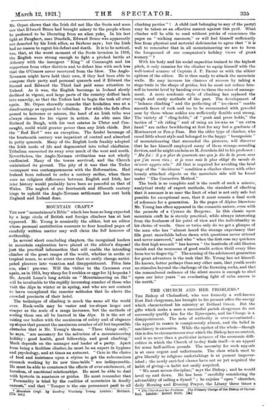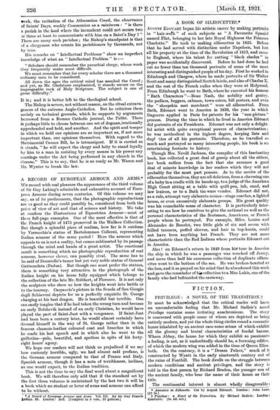THE CHURCH AND HER PROBLEMS.*
THE Bishop of Chelmsford, who was formerly a well-known East End clergyman, has brought to his present office the energy which characterized his ministry at Bethnal Green. But the gifts which make a man a successful parish clergyman do not necessarily qualify him for the Episcopate, and his Charge is a disappointment. The note of authority is over-accentuated ; the appeal to reason is conspicuously absent, and the belief in machinery is excessive. While the upshot of the whole—though this is due to circumstances over which the Bishop has no control, and is no more than a particular instance of the economic diffi- culties in which the Church of to-day finds itself—is an appeal for some half-million pounds. The necessity for such appeals is at once urgent and unfortunate. The class which used to give liberally to religious undertakings is at present impover- ished ; the newly enriched classes have not as yet acquired the habit of giving—a habit not easily acquired. " We must secure discipline," says the Bishop ; and he would level up and down. He has been " carefully considering the advisability of calling a Synod " ; he enjoins " open " churches, daily Morning and Evening Prayer, the Litany three times a • The Church and her Problem& The Primary Charge of the Bishop of Chelms- ford. London Bebert Scott. [21.1 week, the recitation of the Athanasian Creed, the observance of Saints' Days, weekly Communion as a *minimum : " is there parish in the land where the incumbent could not secure two
or three at least to communicate with him on a Saint's Day 7 " There are many such parishes ; the Bishop's standpoint is that of a clergyman who counts his parishioners by thousands, not by tens.
His remarks on " Intellectual Problems " show an imperfect knowledge of what an " Intellectual Problem " is :- " Scholars should remember the parochial clergy, whose work they frequently make most difficult.
We must remember that for every scholar there are a thousand ordinary men to be considered.
All down the ages the critical mind has assailed the Creed ; and yet, as Mr. Gladstone emphasized, it stands secure on the impregnable rock of Holy Scripture. The subject is one of great difficulty."
It is ; and it is better left to the theological school.
The Bishop is severe, not without reason, on the ritual extrava- gances of the extreme Anglo-Catholics. But he criticizes them mainly on technical grounds, which he supports by arguments borrowed from a Roman Catholic journal, the Tablet. There
is perhaps little to choose between one set of dogmas, irrationally apprehended and held, and another. And the spirit and temper in which we hold our opinions are as important as, if not more important than, our opinions themselves. With regard to the Matrimonial Causes Bill, he is intransigent. If it is carried as it stands, " he will expect the clergy and laity to stand loyally by him to a man in resisting by every means in his power any marriage under the Act being performed in any church in the diocese." This is to say, that he is as ready as Mr. Wason and Mr. Wynter to break the law.



































 Previous page
Previous page